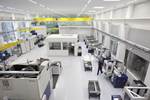Engel Begins Construction of New Automation Factory in Poland
Engel subsidiary TMA Automation Sp. z o.o. is building a new office and production building in Gdansk, Poland.
Engel Group subsidiary TMA Automation Sp. z o.o. has begun construction of a new office and production building near the Gdansk Airport in Poland. Engel acquired a majority stake in TMA Automation in 2022, and in a release, the company said the new building in Gdansk will “intensify the collaboration” between the two entities. TMA Automation remains active in the market as an independent brand, and while its founders Marek Łangowski and Piotr Orlikowski will continue to manage the business, Walter Aumayr was named VP for post-merger integration of the Engel Group and managing director at TMA Automation. In this role, Engel says Aumayr will “supplement the local management team and strengthen the connection to the Engel Group.”

A digital rendering of TMA Automation’s new facility to open in Gdansk, Poland. Source: Engel
The new building is part of an expansion strategy for TMA Automation, which includes a doubling of the company’s workforce. TMA manufactures customized automation systems for Eastern Europe, specializing in developing and installing customized systems targeting in-mold labelling (IML), side-entry robots, palletizing and stand-alone assembly.
Engel notes that its collaboration with TMA in the region began long before the Austrian company acquired a majority stake in 2022. The new building is expected to be completed by autumn 2025. TMA was founded in 2010 in Gdynia, Poland, roughly 15 miles from the Gdansk Airport.
Related Content
-
ICIS Launches: Ask ICIS Generative AI Commodities Assistant
Said to be the first of its kind, this AI assistant will enhance access to ICIS’ intelligence and insights for the energy and chemical markets.
-
'Smart,' Moisture-Based Drying Technology Enhanced
At NPE2024, Novatec relaunches DryerGenie with a goal to putting an end to drying based on time.
-
Drones and Injection Molding Ready for Takeoff
Drones and unmanned aerial vehicles (UAV) are approaching an inflection point where their production volumes — and functionality — will increasingly point to injection molding.






